|

Autumn 1997 (5.3)
Pages 24-29

By the beginning of the 20th
century, the oil boom in Azerbaijan had reached its peak, and
Baku-once a sleepy medieval city-had become the center of an
oil industry, producing more than 50 percent of the world's supply
of oil. In this newly charged atmosphere, there was a rapid influx
of ideas from other countries, especially from Europe. For instance,
film enjoyed an early introduction to Azerbaijan, arriving there
just a few years after its invention in France. In the following
article, Asim Jalilov provides a sense of what has happened to
film in Azerbaijan as filmmakers sought to reflect a true slice
of life through the artistic form of motion pictures.
On May 14, 1916, Baku cinema goers were stunned by the premiere
of a movie entitled "In the Realm of Oil and Millions."
The film was based on a novel by Ibrahim Musabeyov and opened
at the "Biography," a very fashionable theater those
days.
In the story, a group of local men try to convince residents
that oil deposits worth millions literally lay at their feet.
To access it, one had only to pierce the road with something
sharp, such as a walking stick. The hero of "Realm,"
it turns out, ends up making a fortune on a field two steps away
from the corner of his house.
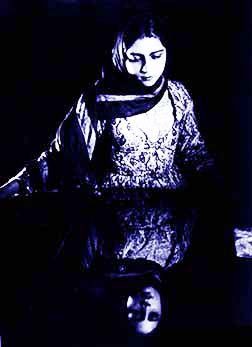  Left: From "Sevil," 1929. The film was directed
by A. Beynazaro and the screenplay written by Jafar Jabbarli.
The film deals with women's rights. It challenged women to take
off their veils. Left: From "Sevil," 1929. The film was directed
by A. Beynazaro and the screenplay written by Jafar Jabbarli.
The film deals with women's rights. It challenged women to take
off their veils.
The movie, a melodrama,
was produced at the local studio "Film." It astounded
moviegoers from all backgrounds, not because of any unusual special
effects, but simply because the filmmaker managed "to show
everything as it is," without artificial nuances. Up to
that time, audiences were mostly used to watching entertaining
pieces about life abroad-films based in countries like France,
Germany and England. "Realm" provided one of the first
opportunities for Azerbaijanis to see their own native city and
their own people in motion pictures.
The movie was an eye-opener. It showed a world of glaring diametrical
opposites, a bipolar society eternally divided between rich and
poor, strong and weak, where the interests of one group clearly
did not coincide with those of the other.
The most striking scenes showed sweaty, dirty laborers working
in filthy, polluted oil fields. For the first time a filmmaker
dared to show the truth, no matter how bitter it was. He challenged
the audience's feelings of sympathy while leaving the final judgment
up to them.
The trend toward realism continued in the movies that followed
as there were no restrictions concerning the filmmaker's choice
of topics. Problems began to arise, however, when the Bolsheviks
came to power in Azerbaijan in 1920, causing the collapse of
the short-lived independent Democratic Republic of Azerbaijan
(1918-1920) and the eventual establishment of Soviet Azerbaijan
(until 1991).
Movies for the
Masses
The Commissars who led the movement in Baku not only monopolized
the government and abolished personal property; they also interfered
with intellectual and spiritual spheres. Only two attitudes were
allowed: condemnation for everything connected with the past
and praise for everything related to a new set of values based
upon the Leninist interpretation of history. The slogan "Anyone
who is not with us, is against us!" won widespread acclaim.
The wave of nationalization affected everything, including cinema,
which Lenin deemed "the most important of all arts,"
since he believed they were the best way to propagate revolutionary
ideas to the masses.
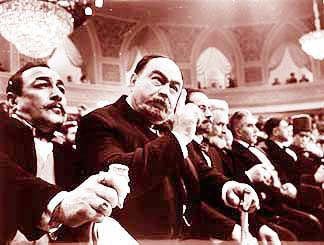  Left: From "26 Baku Commissars"
(26 Baku Komissary), 1966. Aghdar Ibrahimov directed the film.
The main figure (above) is Adil Iskandarov who plays Khachatorov.
The movie is about the dramatic revolutionary events in Baku
in 1918. Left: From "26 Baku Commissars"
(26 Baku Komissary), 1966. Aghdar Ibrahimov directed the film.
The main figure (above) is Adil Iskandarov who plays Khachatorov.
The movie is about the dramatic revolutionary events in Baku
in 1918.
Echoing Lenin, one of the leaders of Azerbaijan at that time
wrote: "In the East, where people are used to thinking mostly
in images, the cinema is the only possible means of propaganda
that doesn't need any preliminary preparation of the masses."
In July 1920, barely two and a half months after the Soviets
occupied Azerbaijan, a decree was made to nationalize the film
industry. This decision politicized the entire creative process
and severely limited the choice of topics. It meant that filmmakers
had to follow government policy.
One of the veterans of Azerbaijani cinema, film director Tofig
Taghizade, born in 1919, observed: "Before the Soviets came,
seven or eight entertaining films had already been produced.
They were mainly comedies and melodramas. Though I'd rather not
discuss their quality, one of them ("In the Realm of Oil
and Millions") was quite serious. But with the arrival of
new power, the Azerbaijani screen reflected the headlines of
newspapers-such as "The Parade of the 11th Red Army in Baku,"
"'The Funeral of the 26 Baku Commissars" and other
similar titles.
A whole series of films about the Revolution [of 1917] followed.
In addition, there were films about women's emancipation and
the struggle against religious fanaticism. These revolutionary
movies were based on the same pattern, variations on the same
theme. Always central to the plot were workers or peasants from
remote villages, full of class hatred toward their exploiters.
The landlords and capitalists were depicted as being evil and
were often satirized. There were no nuances in the description
of the heroes or events. The characters were like pawns on a
chessboard-whites on the one side, blacks on the other.
But at the beginning of the century, the truth is that Azerbaijani
peasants were so backward and uneducated that they didn't understand
the nuances of what "class struggle" meant. The same
was true of Azerbaijani workers. They were too occupied with
their own everyday, mundane problems to think about destroying
the foundations of society. So the characters in these revolutionary
movies were quite exaggerated. Without a doubt, they misrepresented
the reality of the period.
I don't want to condemn the creators of these films. Obviously,
they either believed in what they were doing or, perhaps, didn't
have any other choice. They were obliged to deal with the system
and yet try to make a positive contribution in it.
Filming Between
the Lines
When I asked Tofig Taghizade whether some filmmakers tried to
step outside these boundaries, he told me he didn't remember.
"The rules of the game were very cruel, especially after
Stalin's 1937 repression when hundreds of thousands of Soviet
citizens, many of whom were only suspected of resisting the government,
were hauled off to labor camps in Siberia. Most of them never
returned."
What freedom of speech could have existed in this environment?
Even "Arshin Mal Alan" (1945) risked being stopped.
Based on a comic opera (1910) by composer Uzeyir Hajibeyov, the
film was attacked because of its "bourgeoisie inclinations."
(The events take place in the homes of a landowner and a merchant.)
In fact, the plot is actually not about wealth but rather about
finding a bride to marry. The only reason the movie wasn't banned
was that Stalin liked it himself. In fact, he honored Hajibeyov
with the Stalin Prize for it, making him the first Azerbaijani
to receive such an award.
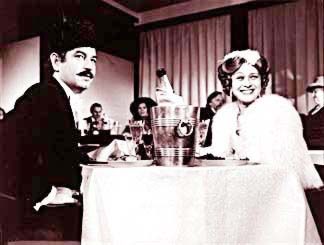 |
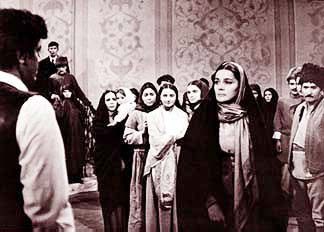 |
Left: From "Gold Precipice" (Gyzyl
Uchurum) 1980. Directed by Fikrat Aliyev. Scene at a restaurant
in Paris. Jalil with his mistress.
Right: From "Sevil," 1970. Directed
by Vladimir Goriket. Left, Sevil (Valentina Aslanova) is insulted
by Balash (Hasan Mammadov). Original film in 1928 challenged
women to take off their veils.
I, myself, experienced
a few incidents with censorship while preparing the movie, "On
Distant Shores." The film was about an Azerbaijani WW II
hero, a secret service agent named Mehdi Huseinzade. Since the
movie was based on a true story, the script was based on historical
facts and documents. But the movie was stopped in Moscow at the
very last moment. The censors didn't like the fact that the hero
was Azerbaijani. "Are you saying that some southerner from
Azerbaijan won the war against the Germans?" they pressed
me. I tried to persuade them of the truth of the events, but
they balked and didn't want to allow me to release the film.
I finally succeeded after contacting some influential people
that I knew personally.
Unfortunately, the destiny of all films from the 15 republics
was in the hands of Moscow censorship. To get film approval took
months, sometimes years. Everything was centralized. Films were
allowed to be shown only after the process of "purification
from ideological ambiguity." Even those movies which had
been made according to very high levels of professionalism were
not able to escape; often, realities were replaced by contrived
situations and events.
One famous Russian actor recently talked about his experiences
on a television interview. "It was the post-war years in
Russia. Life in the country was extremely hard. People were hungry,
almost everything had been destroyed. But we were making a film
showing happy faces as if life were a paradise. Once while we
were taking a break from filming, a local citizen, an old woman
dressed very shabbily, approached me. Looking at the expensive
shirt I was wearing, she asked, 'Whose life are you telling about?'
And I replied 'Ours.' And she looked at me and said, 'You're
too young, and, besides, you're lying,' and then she walked away."
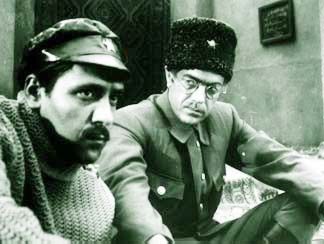  A New Generation A New Generation
Photo: From "Last Mountain Pass"
(Akhirinji Ashirim) 1971. Directed by Kamil Rustambeyov. Left,
Hasan Mammadov as Abbasgulu bey with Hamlet Khanizade as Talybov.
During the "Khrushchev thaw" after the death of
Stalin, a new generation of filmmakers emerged. They were progressive-thinking
artists who resisted dogma. They included names like Magus and
Rustam Ibrahimbeyov, Rasim Ojagov, Anar, Eldar Guliyev, Ogtay
Mirgasimov and others. All of them had graduated from the Moscow
Institute of Cinematography.
In 1979, the steady, predictable course of Soviet cinema was
disrupted by a film called "Inquisition" (Rustam Ibrahimbeyov
and Rasim Ojagov). This landmark film was based on a psychological
drama. The hero, Seyfi, is an honest magistrate who looks for
evidence to prove that the responsibility for a certain crime
lies with the rulers of the society, somewhere in the government.
The plot develops to show that the man accused of committing
the crime is actually the victim of it himself.
  Left: From "Interrogation" (Istintag), 1979.
Directed by Rasim Ojagov, screenplay by Rustam Ibrahimbeyov.
Elena Smitnova as Ayan. Left: From "Interrogation" (Istintag), 1979.
Directed by Rasim Ojagov, screenplay by Rustam Ibrahimbeyov.
Elena Smitnova as Ayan.
When the film appeared,
there was a huge uproar, not only in film circles but among the
general society as well, especially among party officials. The
regime wouldn't tolerate any ideological deviation, especially
one critical of the law. The creators of the film were trying
to penetrate this forbidden sphere. In their film, they challenged
a society that worshiped false values and who allowed a double
standard of moral and social justice to exist.
It was difficult to get permission
to screen the film. Naturally it was the Party representatives
who resisted the most, along with the office of "ideological
customs" in Moscow. But times were changing.
The opinion of Heydar Aliyev at the time proved very helpful:
"Let them know that there is corruption and bribing going
on in Azerbaijan. The more we hide it, the worse it will become."
Nevertheless, the film was forbidden in certain regions of the
USSR.
Rather ironically, "Inquisition" was awarded the top
prize at the 13th All-Union Film Festival in 1980. A year later
it won the USSR State Prize.
Today's Azerbaijani filmmakers continue the quest to present
reality as they understand it. As Rustam Ibrahimbeyov says, "there
have always been people who have felt the necessity of change
earlier than others. Such people are essential for society. Nothing
is more important than human initiative and the freedom to create...To
find and support such people is the great task of both literature
and art."
Asim Jalilov is a screenwriter and journalist living in Baku.
From
Azerbaijan
International
(5.3) Autumn 1997.
© Azerbaijan International 1997. All rights reserved.
Back to Index
AI 5.3 (Autumn 1997)
AI Home | Magazine
Choice
| Topics
| Store
| Contact
us
|







